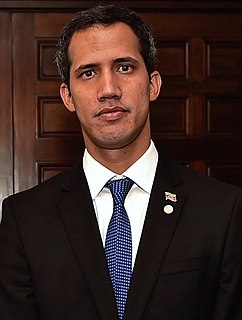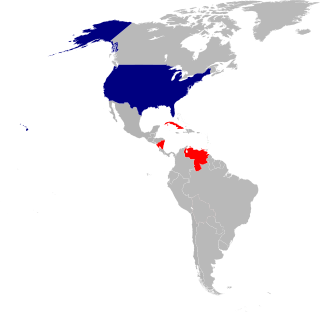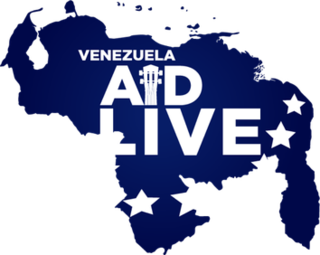 W
WThe 2019 Venezuelan Amnesty Law is a law promulgated by the National Assembly of Venezuela that was created to give amnesty to civilians, military and other officials identified as prisoners, persecuted and political exiles for acts committed from 1 January 1999 until the promulgation of the law, and that included political acts such as rebellion and sedition. Its objective was to eliminate some legal effects that could endanger the consolidation of a new government during the 2019 Venezuelan presidential crisis.
 W
WThe 2019 Venezuelan protests are a collection of protests that have been organized, since 11 January, as a coordinated effort to remove Nicolás Maduro from the presidency. Demonstrations began following Maduro's controversial second inauguration, developing into a presidential crisis between Maduro and National Assembly president Juan Guaidó. The protests also include counter-demonstrations organized by those who support Maduro.
 W
WOn 30 April, during the Venezuelan presidential crisis, a group of several dozen military personnel and civilians joined Juan Guaidó in his call for an uprising against Nicolás Maduro as part of what he labeled "Operation Freedom". Reuters reported an "uneasy peace" by the afternoon of 30 April. During the uprising attempt, opposition leader Leopoldo López was freed from house arrest after being imprisoned for five years. The head of the Bolivarian Intelligence Service, Manuel Cristopher Figuera denounced the Maduro government and was dismissed from his position before going into hiding. At least 25 military men who opposed Maduro sought asylum at the Brazilian embassy in Caracas.
 W
WA group of inmates were involved in a prison riot on 24 May 2019 in the police station cellblocks in Acarigua, Portuguesa state, Venezuela. The riot allegedly began when inmate Wilfredo Ramos was killed following ten days of protests against the denial of visits by relatives.
 W
WNationwide recurring electrical blackouts in Venezuela began in March 2019. Experts and state-run Corpoelec sources attribute the electricity shortages to lack of maintenance and to a lack of technical expertise in the country resulting from a brain drain; Nicolás Maduro's administration attributes them to sabotage. Since March, various nationwide blackouts occurred in the country.
 W
WDuring the 2019 Venezuelan presidential crisis, AP News reported that "familiar geopolitical sides" had formed, with allies Russia, China, Iran, Turkey, Syria, and Cuba supporting Maduro, and the US, Canada, and most of Western Europe supporting Juan Guaidó as interim president. Amid widespread condemnation, President Maduro was sworn in on 10 January 2019, and the President of the National Assembly, Guaidó, was declared the interim President by that body on 23 January 2019. Intervention by the United States in Venezuela has been alleged by allies of Nicolás Maduro and political figures from the left spectrum; Maduro's government states that the crisis is a "coup d'état led by the United States to topple him and control the country's oil reserves." Guaidó denies the coup allegations, saying peaceful volunteers back his movement.
 W
WHyperinflation in Venezuela is the currency instability in Venezuela that began in 2016 during the country's ongoing socioeconomic and political crisis. Venezuela began experiencing continuous and uninterrupted inflation in 1983, with double-digit annual inflation rates. From 2006 to 2012, the government of Hugo Chávez reported decreasing inflation rates during the entire period. Inflation rates increased again in 2013 under Nicolás Maduro, and continued to increase in the following years, with inflation exceeding 1,000,000% by 2018. In comparison to previous hyperinflationary episodes, the ongoing hyperinflation crisis is more severe than those of Argentina, Bolivia, Brazil, Nicaragua, and Peru in the 1980s and 1990s, and that of Zimbabwe in the late-2000s.
 W
WOperación Alacrán, also known as CLAP affair or PSUV-CLAP faction, is the name given to a corruption plot which was denounced in 2019 by the members of the National Assembly of Venezuela. It would have sought to avoid the re-election of Juan Guaidó on 5 January 2020 as President of the Assembly, by obtaining the support of opposing legislators in exchange for millions of dollars. Legislators would have been asked to vote against Guaidó, or to not attend the election and thereby break the necessary quorum.
 W
WPlan País Venezuela is a plan organized by Juan Guaidó and the National Assembly of Venezuela created to revitalize Venezuela's economy, petroleum industry, and social sectors.
 W
WThe second inauguration of Nicolás Maduro as President of Venezuela took place on Thursday, 10 January 2019. The inauguration involved the swearing-in of Nicolás Maduro for his second term, and, especially within the context of Maduro's election, has been controversial and contested by various figures and organizations.
 W
WShortages in Venezuela of regulated food staples and basic necessities have been widespread following the enactment of price controls and other policies under the government of Hugo Chávez and exacerbated by the policy of withholding United States dollars from importers under the government of Nicolás Maduro. The severity of the shortages has led to the largest refugee crisis ever recorded in the Americas.
 W
WThe 2019 Venezuelan protests began in the first days of January as a result of the Venezuelan presidential crisis. Protests against the legitimacy of the Nicolás Maduro's presidency began at the time of his second inauguration following a controversial presidential election in 2018. Rallies of support were also held for President of the National Assembly, Juan Guaidó, with some Venezuelans and foreign government's recognizing him as the acting President of Venezuela.
 W
WTroika of tyranny is a description of the nations of Cuba, Nicaragua and Venezuela used by United States National Security Advisor John R. Bolton in outlining United States foreign policy towards those nations. Bolton has alternately described the three countries as the "triangle of terror" and the "three stooges of socialism", stating that the three are "the cause of immense human suffering, the impetus of enormous regional instability, and the genesis of a sordid cradle of communism in the western hemisphere".
 W
WVenezuela Aid Live was a concert to benefit Venezuela in Cúcuta, Colombia, a city near the Venezuelan border, on 22 February 2019. The all-day concert, called Música por Venezuela: Ayuda y Libertad, was organized by Richard Branson and Bruno Ocampo, and featured over thirty of the best known Latin American artists from nine countries. The concert's slogan was, "Let the stars shine for all".
 W
WDefections from the Bolivarian Revolution occurred under the administrations of Presidents Hugo Chávez and Nicolás Maduro. The 2019 Venezuelan presidential crisis concerning who is the legitimate President of Venezuela has been underway since 10 January 2019, when the opposition-majority National Assembly declared that incumbent Nicolás Maduro's 2018 reelection was invalid and the body declared its president, Juan Guaidó, to be acting president of the nation. Guaidó encouraged military personnel and security officials to withdraw support from Maduro, and offered an amnesty law, approved by the National Assembly, for military personnel and authorities who help to restore constitutional order.
 W
WA crisis concerning the identity of the legitimate president of Venezuela has been underway since 10 January 2019, with the nation and the world divided in support for Nicolás Maduro or Juan Guaidó. The process and results of the 20 May 2018 presidential election were widely disputed. The opposition-majority National Assembly declared Maduro a "usurper" of the presidency on the day of his second inauguration and disclosed a plan to set forth its president Guaidó as the succeeding acting president of the country under article 233 of the Venezuelan Constitution. A week later, the Supreme Tribunal of Justice declared that the presidency of the National Assembly was the "usurper" of authority and declared the body to be unconstitutional.
 W
WOn 12 January 2019, the main telecommunications provider in Venezuela, CANTV, issued a block against the online encyclopedia, Wikipedia. All of CANTV's 1.5 million users were affected by the decision. The block was lifted on 18 January 2019, following widespread criticism against the state-owned company, claiming it was in response to the Venezuelan presidential crisis.